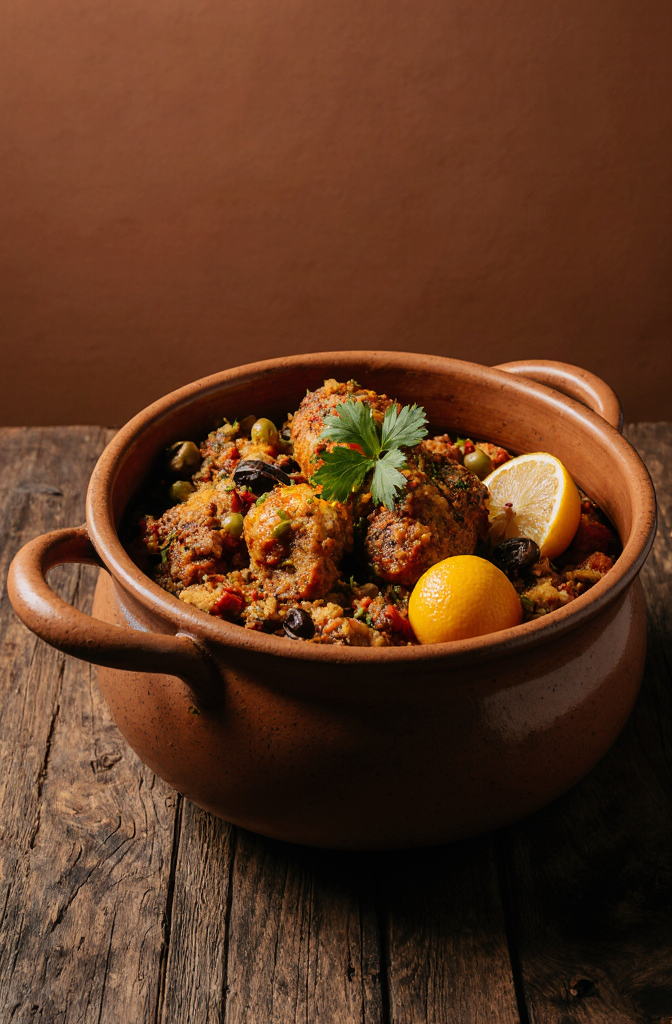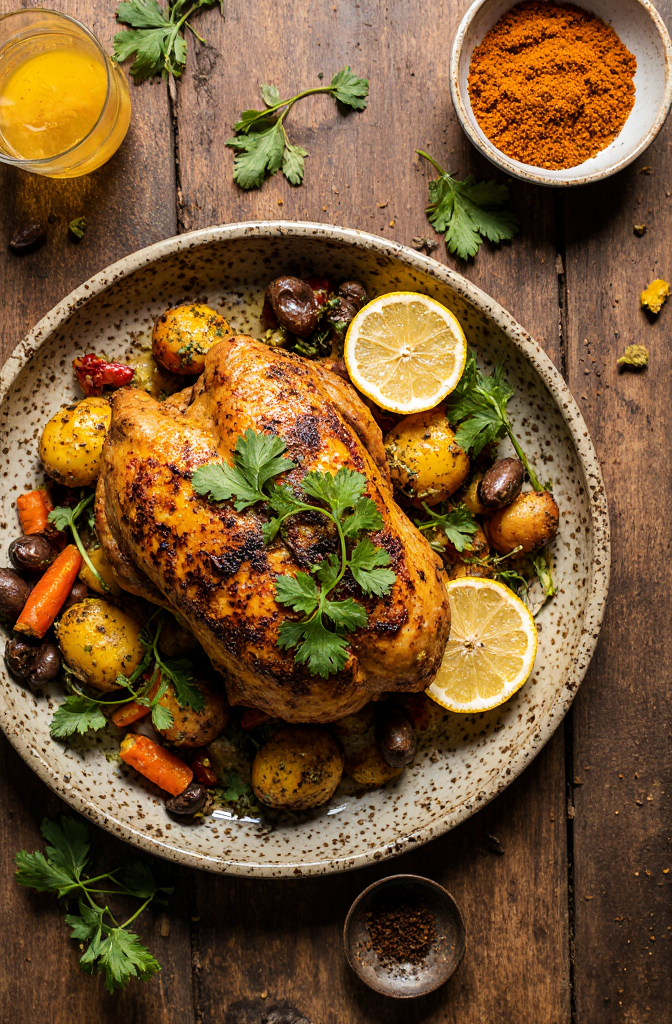25 Ultimate Mouthwatering Moroccan Recipes That Will Instantly Transform Your Cooking
Moroccan recipes represent one of the world’s most flavorful and diverse culinary traditions. From aromatic tagines to delicate pastries, Moroccan cuisine combines influences from Arab, Berber, Mediterranean, and Sub-Saharan African cultures. This comprehensive guide explores the most beloved Moroccan Cuisine that will transport your kitchen to the bustling souks of Marrakech and the coastal towns of Casablanca.
What Makes Moroccan Recipes Unique?
Moroccan recipes are distinguished by their masterful use of spices, slow-cooking methods, and the perfect balance of sweet and savory flavors. The foundation of Moroccan cooking lies in spice blends like ras el hanout and harissa, cooking vessels like the traditional tagine, and ingredients such as preserved lemons, argan oil, and dates.
The beauty of Traditional Moroccan cuisine lies in their complexity achieved through simple techniques. Most dishes require minimal preparation but reward patience with incredibly deep flavors developed through slow cooking and careful seasoning.
Essential Ingredients for Authentic Moroccan dishes
Before diving into specific Famous recipes, understanding key ingredients is crucial for authentic results:
Spices: Cinnamon, cumin, coriander, ginger, turmeric, saffron, and paprika form the backbone of Moroccan flavoring.
Preserved ingredients: Preserved lemons, olives, and dried fruits like dates and apricots add distinctive tangy-sweet notes.
Fresh herbs: Cilantro, parsley, and mint appear in most Traditional Moroccan cuisine, adding brightness and color.
Specialty items: Rose water, orange blossom water, and argan oil provide unique Moroccan flavors impossible to replicate with substitutes.
Top 15 Traditional Moroccan Recipes
1. Chicken Tagine with Preserved Lemons and Olives
This classic among Moroccan meals features tender chicken slow-cooked with aromatic spices, briny olives, and tangy preserved lemons. The tagine cooking method creates incredibly moist, flavorful meat that falls off the bone.
Cooking time: 1 hour 15 minutes Difficulty: Medium Serves: 4-6 people
2. Moroccan Lamb Tagine with Apricots
Sweet meets savory in this beloved Moroccan recipe. Tender lamb is braised with dried apricots, onions, and warm spices like cinnamon and ginger, creating a dish that perfectly represents Moroccan cuisine’s signature flavor profile.
3. Couscous Royale
Perhaps the most famous of all Moroccan meals, couscous royale combines fluffy semolina grains with an array of vegetables, chickpeas, and your choice of meat. This dish often serves as the centerpiece for Friday family gatherings.
4. Harira Soup
This hearty soup is a staple in Moroccan dishes at home, traditionally eaten to break the fast during Ramadan. Made with lentils, chickpeas, tomatoes, and aromatic herbs, harira provides comfort and nourishment in every bowl.
5. Pastilla (B’stilla)
This sophisticated pastry showcases the sweet-savory combination that defines many Moroccan dishes at home. Layers of crispy phyllo dough encase spiced chicken or pigeon, almonds, and eggs, finished with a dusting of cinnamon and powdered sugar.
6. Moroccan Fish Chermoula
Coastal Authentic Moroccan dishes feature abundant seafood, and this dish highlights fresh fish marinated in chermoula – a vibrant sauce made with cilantro, parsley, garlic, and preserved lemons.
7. Kefta Tagine with Eggs
Ground meat seasoned with traditional Moroccan spices is formed into meatballs and simmered in a rich tomato sauce, topped with eggs in this comforting family-style dish from classic Moroccan dishes at home.
8. Moroccan Mint Tea
No collection of Moroccan cooking would be complete without the national drink. This sweet, refreshing tea combines green tea, fresh mint, and sugar, served in traditional glasses.
9. Zaalouk (Eggplant Salad)
This smoky, flavorful salad represents the vegetable-focused side of Moroccan cooking. Roasted eggplant is combined with tomatoes, garlic, and spices to create a versatile side dish.
10. Moroccan Orange Salad
Simple yet elegant, this refreshing salad showcases the citrus that grows abundantly in Morocco. Oranges are dressed with orange blossom water, cinnamon, and sometimes dates for a perfect light meal.
11. Mechoui (Slow-Roasted Lamb)
Traditional celebration food in Traditional Moroccan dishes, mechoui, involves slow-roasting lamb with a spice rub until incredibly tender. This dish often appears at weddings and special occasions.
12. Moroccan Carrot Salad
This vibrant side dish adds color and nutrition to any meal. Carrots are cooked until tender and dressed with warm spices, herbs, and lemon juice, representing the healthy aspect of Traditional Moroccan dishes.
13. Chebakia
These flower-shaped pastries are among the most beloved sweet Traditional Moroccan dishes. Deep-fried dough is shaped into intricate patterns, then coated in honey and sesame seeds.
14. Moroccan Bread (Khubz)
Fresh bread accompanies every meal in Morocco. This recipe for traditional round loaves provides the perfect vehicle for soaking up tagine sauces and dips.
15. Sellou (Moroccan Energy Mix)
This nutritious blend of roasted flour, almonds, sesame seeds, and dates represents the health-conscious side of traditional Moroccan recipes, often given to new mothers and growing children.
Cooking Techniques for Moroccan Recipes
Success with Traditional Moroccan dishes depends on mastering several key techniques:
Tagine cooking: This slow-braising method in the conical clay pot creates incredibly tender results. The shape allows steam to circulate and condense, keeping food moist.
Spice toasting: Many Traditional Moroccan dishes begin with toasting whole spices to release their essential oils before grinding.
Layered flavoring: Building flavors in stages – browning meats, sweating aromatics, adding spices at different times – creates the complex taste profiles Moroccan recipes are famous for.
Slow cooking: Patience is essential in Moroccan recipes. Low, slow cooking allows tough cuts of meat to become tender and flavors to meld completely.
Regional Variations in Moroccan Recipes
Moroccan recipes vary significantly by region:
Northern Morocco: Influenced by Spanish and Mediterranean cuisines, featuring more seafood and rice dishes.
Central Morocco: Home to classic tagines and couscous, representing what most people consider typical Moroccan recipes.
Southern Morocco: Features more Berber influences with simpler preparations and desert ingredients like dates.
Coastal areas: Emphasize fresh seafood and lighter preparations compared to inland Moroccan recipes.
Health Benefits of Moroccan Recipes
Traditional Moroccan recipes offer numerous health benefits. The extensive use of spices like turmeric and ginger provides anti-inflammatory properties. Many dishes are naturally gluten-free when served without bread. The emphasis on vegetables, legumes, and lean proteins creates well-balanced meals.
The cooking methods used in Moroccan recipes – especially tagine cooking – require minimal added fats while maximizing flavor through spices and slow cooking techniques.
Tips for Success with Moroccan Recipes
Invest in quality spices: Fresh, high-quality spices make an enormous difference in Moroccan recipes. Buy whole spices when possible and grind them yourself.
Don’t rush the process: Moroccan recipes reward patience. Allow time for proper browning, slow cooking, and flavor development.
Taste and adjust: Traditional Moroccan recipes often lack precise measurements because cooks adjust seasonings by taste. Start with recipe amounts and adjust to your preference.
Use proper cookware: While not essential, a traditional tagine does improve results for many Moroccan recipes. Heavy-bottomed pots with tight-fitting lids work as substitutes.
Shopping for Moroccan Recipe Ingredients
Finding ingredients for Moroccan recipes has become easier with increased availability in mainstream grocery stores. Middle Eastern markets offer the best selection of specialty items like preserved lemons, rose water, and authentic spice blends.
Many ingredients for Moroccan recipes can be ordered online, including hard-to-find items like argan oil and ras el hanout spice blend. Making your own preserved lemons and spice blends can also be rewarding and cost-effective.
Meal Planning with Moroccan Recipes
Moroccan recipes work wonderfully for meal planning because many improve with time. Tagines, soups, and stews can be made ahead and reheated, often tasting better the next day.
When planning meals around Moroccan recipes, consider balancing rich main dishes with lighter sides like salads and vegetable preparations. The cuisine naturally provides variety in textures, temperatures, and flavors within a single meal.
Modern Adaptations of Traditional Moroccan Recipes
Contemporary cooks are adapting traditional Moroccan recipes for modern lifestyles. Slow cooker and pressure cooker versions of classic tagines save time while maintaining authentic flavors. Health-conscious adaptations reduce oil and increase vegetables without sacrificing the essential character of Moroccan recipes.
Fusion approaches combine Moroccan spice profiles with familiar techniques, making these flavors accessible to those new to the cuisine.
Conclusion: Embracing Moroccan Recipes in Your Kitchen
Moroccan recipes offer home cooks an opportunity to explore one of the world’s most sophisticated and flavorful cuisines. Whether you start with simple dishes like Moroccan mint tea and progress to complex pastillas, each recipe provides a window into Morocco’s rich cultural heritage.
The key to success with Moroccan recipes lies in understanding that they represent more than just cooking instructions – they’re a connection to centuries of culinary tradition that values hospitality, family gathering, and the transformative power of spices.
Begin your journey with Moroccan recipes today by trying one of the simpler dishes like harira soup or Moroccan carrot salad. As your confidence grows, tackle more complex preparations like chicken tagine or pastilla. Each dish you master brings you closer to understanding the soul of Moroccan cuisine.
Remember that Moroccan recipes are forgiving and adaptable. Don’t be afraid to adjust spices to your taste or substitute ingredients based on availability. The most important element is approaching these recipes with curiosity, patience, and appreciation for the rich culinary tradition they represent.
With practice, these Moroccan recipes will become natural additions to your cooking repertoire, bringing the warm hospitality and incredible flavors of Morocco to your family table.




